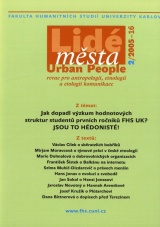Loneliness and Insignificance in Perspective of Arendt's Typology of Human Activities
DOI:
https://doi.org/10.14712/12128112.3902Abstract
The paper points to the fact of Arendt’s analysis of totalitarism (H. ARENDT, The Origins of Totalitarism) having its starting point in the distinction made by Montesquieu between forms of government on one hand and principles of government on the other, which, applied by Arendt to the phenomenon of totalitarism, allows her to analyse the relationship between ideology and terror in a particular manner. When she asks the hermeneutical question of what problems ideology and terror are the solution of, it appears to her that the answer is it is the problem of loneliness and that of insignificance (superfluousness) we are confronted with here. In order to understand these problems in connection with the modern concept of the human being, it is imperative for us to see their import on the background of the description by Marx of labour in its extreme form of machinery. The phenomena of loneliness and insignificance (superfluousness) appear then as pieces of experience concomitant to a certain general mode of understanding the relationship between humans and their world, whereby human beings are considered components of a self-contained system of processes. This insight, then, allows us also to discern the phenomena of loneliness and insignificance (superfluousness) as pieces of experience concomitant to human beings’ self-understanding in a society of ever increasing production and consumption. As long as this viewpoint is maintained, the danger of ideological thinking and possible resulting forms of terror proves a relevant problem. For the complex of the interrelated questions under discussion to be fully understood, it is imperative that we should discern the inveterate tenacity, in the history of European metaphysical tradition, of the motive of processuality, which also bears upon the forming of the relationship between human beings and their world.
Downloads
Published
How to Cite
Issue
Section
License

This work is licensed under a Creative Commons Attribution-NonCommercial-NoDerivatives 4.0 International License.



